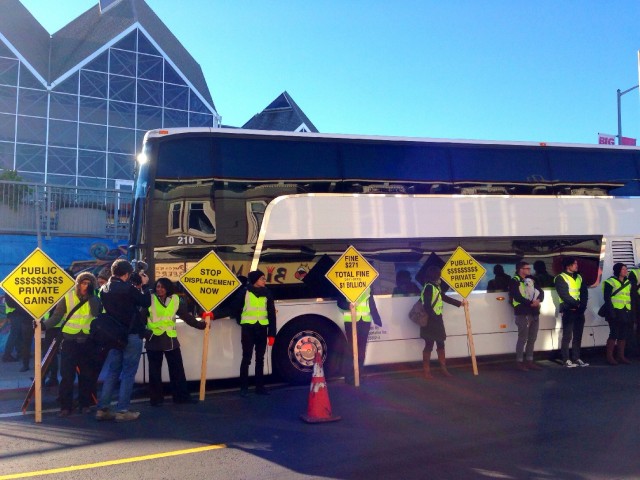
Read: "Resisting Monoculture" by Rebecca Solnit in Guernica.
San Francisco author Rebecca Solnit has got a thing or two to say on a wide array of subjects, from pioneering photographer Edward Muybridge to the history of walking to the landscape, politics and culture of the West, particularly her longtime hometown of San Francisco.
Last year, she wrote an essay for the London Review of Books on the meaning of San Francisco's rapidly proliferating fleet of technology shuttle buses. I think lots of people were noticing the big white motor coaches swooping into Muni bus zones around the city to carry workers to Apple, Google, Facebook and other Silicon Valley corporate campuses. But Solnit's piece was a sort of declaration that the buses are a key part of the engine remaking the city in a particularly unfriendly way for anyone not employed with the technology industry or engaged in some other lucrative enterprise. "Most of them are gleaming white," she wrote in opening the essay, "with dark-tinted windows, like limousines, and some days I think of them as the spaceships on which our alien overlords have landed to rule over us."
Anyway, here we are in 2014, and the buses have become targets of protests by activists fighting the sharp increase in rents and evictions in the city. The buses have also drawn their defenders, who argue mainly they cut the number of private cars crowding the roads from the city to Silicon Valley. Among those speaking up on behalf of the buses is Ben Adler, a writer for the environmental news site Grist, who took Solnit and other bus critics to task for ignoring the buses' claimed benefits:
Solnit’s complaint that Google thinks its employees are too important to “drive themselves” is backward and nonsensical. Driving in one’s own private car is far more elitist than sharing a bus with one’s coworkers. It is also vastly worse for the environment. The buses take cars off the road. Fewer cars mean less traffic, and less idling in traffic, which is especially polluting.
Now Solnit is back with another broadside that takes aim at Adler and Grist, questions the environmental claims made for the buses and broadens her critique of the tech sector's impact on the city. Her new essay, "Resisting Monoculture," was published Tuesday by online culture journal Guernica. She says in part:
I’m seeing the town that gave birth to the Sierra Club and Rainforest Action Network and seminal movements for human rights, a town that produced great insurrection and antiwar activism and idealism and new social ideas, become a place where you can’t afford to live unless you’re doing something incredibly lucrative and time-consuming -- and probably involving technology corporations. A young human rights activist is not so likely to be able to afford to live here, or a nurse’s aide, or a baker, and so the biodiversity of the city is being laid waste, and in its place springs up a monocrop of technology workers. If this continues, the contributions San Francisco has given the world will not be given any more.
People who like green transit need to consider that when a place becomes the economic equivalent of a luxury resort, the urban equivalent of Jackson Hole, the laborers who really keep the place running -- the people who clean and cook and drive and build and care for the old, the young, the frail -- need to come in from far away. And no luxury coaches come to fetch the home healthcare worker from Richmond or the construction worker from Tracy. It’s unhealthy when firefighters and teachers can’t afford to live in the community they care for, and San Francisco was already tough that way: it’s now, thanks to the Silicon Valley incursion, getting a lot worse.